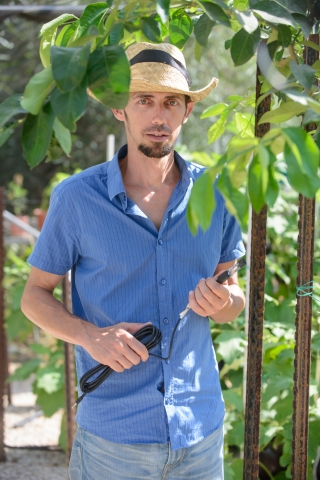Dr. Tamir Klein
Trees and the future of climate change
New scientists

Dr. Tamir Klein lives and breathes trees, studying them and the forests in which they reside using a wealth of measurements and details that try to capture a vivid picture of how trees process water, air, and carbon. And in doing so, he’s helping to ensure that as the earth continues to heat up, we are just that much more prepared.
A new member of the Department of Plant and Environmental Sciences, he has discovered new insights into how trees cycle water and nutrients between leaves, stems, and roots—and has even shown evidence for a certain amount of so-called “carbon trade” between roots of nearby trees. Scientists have suspected for years that trees share certain nutrients through intertwining root systems, and have measured the transport of some elements on a small scale in lab experiments. During his postdoctoral fellowship at the University of Basel, Dr. Klein quantified, for the first time, the large transfer of carbon and other nutrients between mature trees of different species—showing in an unprecedented way how trees share resources with one another underground and keep each other healthy.
In his postdoc, Dr. Klein and his colleagues infused industrially produced CO2 at the leaf canopy level in 40-meter-tall Norway Spruce trees. This CO2 has an inherently unique signature of carbon isotopes that thus serves as a marker when measuring for its presence in other trees. “We were surprised to find the same isotopes present in the roots of neighboring trees of three different species that were not exposed to the CO2,” says Dr. Tamir. Delving deeper, they identified symbiotic fungi (called mycorrhiza) associated with the root systems that form “underground highways” for carbon and nutrient exchange between the trees. In an article published in Science in 2016, they further showed that 40 percent of the fine root carbon can be traced to these tree-to-tree transfer networks—a thriving interconnected economy.
Preparing for drought, global warming
Dr. Klein was born in Eilat and earned a BSc in biochemistry and food sciences at the Hebrew University of Jerusalem's Faculty of Agriculture, Food, and Environment in Rehovot. He crossed the street for his master’s and doctoral degrees in plant sciences at the Weizmann Institute, where he simultaneously lectured and developed courses in the Department of Science Teaching, and taught English and math at the Davidson Institute of Science Education. After he completed his postdoc in Switzerland, he worked as a researcher at Israel’s Agricultural Research Organization Volcani Center in Beit Dagan before joining the Institute last year.
“Studying trees matters since they are an essential part of the puzzle of global climate change,” says Dr. Klein. He is especially interested in the role of trees in the global water and carbon budgets, explaining: “Trees form the largest biological carbon pool on Earth, and forests control the water cycle around them through the uptake of water through roots and water loss through leaves.”
And he’s thinking forward. In order to mimic what greenhouse gases might have in store for life on Earth 50 years from now, he plans to adapt greenhouses at the Weizmann Institute to create growing areas having atmospheric conditions matching those that existed before the Industrial Revolution, present-day conditions, and double the concentration of greenhouse gases we have today. He is also investigating the drought-resistance mechanisms of lemon trees, work that he started at the Volcani Center. “Even irrigation does not cancel out the exposure of fruit trees to drought, so the development of drought-resistant varieties of lemons, almonds, olives, and other tree crops common to Israel would allow them to grow in even drier areas,” he says. This could be a boon to countries that would like to produce such crops but can’t today, given the local climate. And it would help prepare for hotter, drier times.
Dr. Tamir Klein is funded by The Benoziyo Fund for the Advancement of Science, The Monroe and Marjorie Burk Fund for Alternative Energy Studies, The Merle S. Cahn Foundation, Mr. and Mrs. Norman Reiser, Annadale, VA. Dr. Klein is the incumbent of the Edith and Nathan Goldenberg Career Development Chair.

Dr. Tamir Klein








